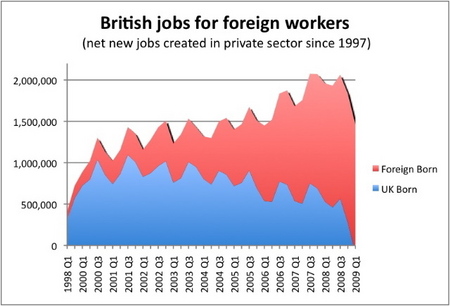As promised, here’s the full story of those immigration statistics that I obtained from the ONS. In our new e-world, I can pass on all the results to you – and they’re worth discussing. The figures show the extent to which Brown’s “boom” was a mirage built not just on debt, but foreign labour. Most seriously, we can see a deep dysfunctionality in the UK labour market. Our system keeps millions on benefits (never less than 5 million have been on some kind of benefits since 1997) while meeting the needs of expanding the economy with a limitless supply of industrious immigrant labour. This means that the direct link between a growing economy and combating poverty is broken – and this is a serious development that demands attention.
The ONS results are here, in a pdf*. The key finding: there are fewer British-born workers in the first quarter of 2009 than Q1 of 1997. The trend of employers preferring immigrants, which we saw during the boom, has become more marked still during the bust.

But if we zoom in on the last eight years, the recession simply exacerbated what had been an existing downwards trend of UK-born workers in employment while number of foreign-born workers in employment has soared.

Without a doubt, immigration has been the largest change of the Labour years – the ratio of immigrant workers has almost doubled in the private sector and the economy overall as the below graph shows. This means the UK’s the overall mix of immigrants is up there with that of America – a change not taken deliberately, or with any debate, but something that happened by accident and which ministers are still struggling to understand.

I count myself as a supporter of immigration. But there is no doubt that mass immigration has given ministers the option of ignoring our own unemployed. If we didn’t have this unending tap of motivated workers then Britain would be forced to confront the fact that so many of its workers are being incentivised to do nothing by the welfare state. Here’s what the benefit tally, including ‘hidden unemployment’, has looked like in the last decade – using the DWP’s definition of out-of-work benefits.

At no point in the boom did the number on out-of-work benefits fall below five million souls. Almost half have been on welfare for five years or more – and are, therefore, statistically more likely to die than to work again. As I say, were it not for immigration, we’d be forced to confront this problem or our economy would not grow. When I was a business journalist in the late 1990s, I remember writing stories about how bus companies were recruiting in homeless shelters because they couldn’t find the staff. The people in those shelters were being offered structure to their lives, from an employer forced by economic conditions to deal with the greater risk they pose. It was a sign of economic growth addressing social problems – as it should be.
But mass immigration has broken this link. It meant Gordon Brown could actually afford to keep so many million on benefits, as tax receipts were being generated by comparative newcomers. It was a lot easier than trying to reform welfare. Scandalously, that’s what Brown did. To my mind, it is the most contemptible failure of his time as Chancellor. He had the money, the economic boom, to sort out the welfare dependency that afflicts so many communities in Britain. But he took the easy, short term route. To use that analogy the Prime Minister is so fond of deploying, he walked on by on the other side. Why get your hands (and poll ratings) dirty with welfare reform when you can rely on immigrants to keep the economy growing and tax receipts flowing? And who wants to end up with disabled people chaining themselves to the railings of parliament, as happened when Blair tried welfare reform? Brown took the easy option. And his short-termism has condemned millions to worklessness and poverty who might otherwise have escaped it.
This matters for Cameron, because he will inherit Brown’s dysfunctional labour market – one distinguished by its striking failure to provide that now-notorious Brown slogan “British jobs for British workers”. What if, when the recovery comes, the economy just sucks in more immigrants and the huge surge in dole numbers is never properly reversed?
That’s why immigration matters. You can’t understand the UK labour market, or the pernicious nature of the UK welfare state, without it.
The Brown economic model has spectacularly failed to provide British jobs for British workers – this is yet another one of his empty promises that a Tory government will have to fulfill. But unless the Tories work out how employment, welfare and immigration are interlinked they will be destined to repeat the same scandalous failure of the Brown years.
PS All immigration data is from the Labour Force Survey, a Eurostat-mandated study conducted by the ONS which defines immigrant in its most basic sense – ie, ‘foreign born’. No categoriation is perfect, and this of course captures some Brits like Boris Johnson who were born abroad. I also exclude pension-aged people from the study – it’s working-age only. The trend of pensioners returning to work is a topic all by itself.
*If asked for a password it is FraserNels0n







Comments